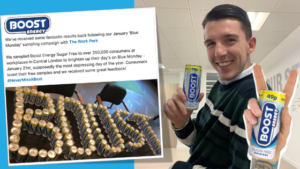Why Is Product Sampling So Powerful

The Power Of Product Sampling
Why Is Product Sampling So Powerful?
Product sampling stands as a highly effective marketing strategy. It’s not just about giving out free products; it’s a nuanced approach to fostering direct consumer engagement and building brand loyalty. A study has highlighted that 35% of consumers who try a sample purchase the product soon after, underscoring the method’s potency in converting trials into sales. This interaction not only boosts brand visibility but also enhances product recall, significantly influencing purchasing decisions. Moreover, workplace environments offer a unique setting where product sampling can lead to even more profound impacts due to the targeted, engaged audience. Through such direct experiences, brands can create lasting impressions, encouraging not just initial purchases but also long-term consumer relationships. This approach underscores the tangible benefits of integrating product sampling into marketing strategies, from heightened brand awareness to increased sales and customer loyalty.
The Impact on Consumer Behaviour
Product sampling significantly enhances consumer perception and quality assessment. A study by Sprott & Shimp (2004) found that consumers who sample a product before buying it have a higher brand quality perception compared with products whose brands did not offer product sampling.
Product samples serve as catalysts for purchase decisions by leveraging cognitive biases such as the availability heuristic, anchoring effect, and zero-risk bias. By making the brand readily available and reducing perceived risks, sampling influences immediate purchase behaviour and fosters brand recall during decision-making processes.
Effective product sampling programmes have been linked to increased brand loyalty, with consumers exhibiting heightened loyalty for an average of 12 months post-sampling. This underscores the long-term impact of sampling initiatives on consumer behaviour.
Understanding these psychological nuances enables businesses to optimise product sampling strategies, fostering brand affinity, influencing purchase decisions, and cultivating long-term customer loyalty.
Building Brand Awareness
Product sampling stands as a formidable strategy for bolstering brand visibility and recognition. Through physical interaction, consumers forge memorable experiences that etch brands into their consciousness, fostering recall and recognition. This direct engagement imbues brands with a tangible presence in consumers’ minds, elevating their prominence in a cluttered marketplace.
Countless brands have reaped the benefits of strategic sampling endeavours. In workplace settings, for instance, companies offer samples of their products to employees, allowing them to experience the brand’s offerings first-hand. This approach not only cultivates immediate interest but also sparks conversations and cultivates a positive brand perception among employees. Moreover, the ripple effect of word-of-mouth marketing post-sampling amplifies brand exposure, as satisfied employees share their experiences with colleagues and friends, leading to organic brand advocacy and heightened awareness.
By harnessing product sampling to create impactful interactions and memorable experiences within workplace or positive environments, brands can significantly bolster their visibility and recognition, paving the way for sustained growth and success.
Engaging with Target Audiences
Product sampling offers a precise approach to reaching specific target demographics, tailoring strategies to resonate with the preferences of distinct consumer groups.
Understanding and aligning with consumer preferences are paramount in crafting effective sampling strategies. For instance, a leading snack brand targeting health-conscious consumers might distribute product samples at gyms/ leisure centres or offices populated by the demographic that actively seeks out nutritious snacks. By targeting locations frequented by individuals with a keen interest in health and wellness, the brand maximises its chances of engaging with its ideal audience.
Case studies showcase the effectiveness of engaging with target audiences through sampling. For example, a beverage brand seeking to appeal to environmentally conscious consumers successfully distributed samples at eco-friendly events, garnering positive feedback and increasing brand awareness among sustainability-minded individuals. This demonstrates the importance of aligning sampling efforts with the values and preferences of the target demographic to achieve meaningful engagement and brand resonance.
Ultimately, successful product sampling hinges on understanding the specific needs and preferences of target audiences. By tailoring sampling strategies to resonate with the demographics most likely to engage with the brand, companies can effectively build awareness, drive engagement, and foster lasting consumer relationships.
Measurable Returns and Success Stories
Product sampling has been shown to yield measurable returns and success stories, underscoring its effectiveness as a marketing strategy.
According to industry reports and studies, brands can expect to experience a significant increase in brand awareness, purchase intent, and customer satisfaction metrics following well-executed sampling initiatives. This highlights the effectiveness of product sampling in driving consumer engagement and fostering brand loyalty.
Ultimately, the success of product sampling initiatives hinges on the ability to understand, anticipate, and meet the needs of specific consumer segments. By tailoring sampling strategies to resonate with the preferences of distinct demographics, brands can effectively build awareness, drive engagement, and cultivate lasting consumer relationships.
In summary, product sampling stands as a proven method for brands to achieve tangible results and success in their marketing efforts, as evidenced by numerous industry case studies and reports. With careful planning and execution, product sampling campaigns can yield significant returns and contribute to long-term brand success.
Nurturing Customer Relationships
Product sampling plays a crucial role in cultivating enduring customer relationships by fostering trust, sustaining interest, and fostering brand advocacy and loyalty.
Sampling contributes to building trust between brands and consumers by allowing consumers to experience products first-hand, demonstrating transparency and confidence in the brand’s offerings. This direct interaction instils confidence in the product’s quality and efficacy, laying the foundation for a trusting relationship.
Post-sampling engagement strategies are essential for sustaining customer interest beyond the initial sampling experience. Brands can leverage various channels such as social media, email marketing, and loyalty programs to stay connected with customers, provide valuable content, and offer incentives for repeat purchases.
Sampling also plays a pivotal role in fostering long-term brand advocacy and loyalty. When consumers have positive sampling experiences, they are more likely to become advocates for the brand, sharing their experiences with friends and family and recommending the products to others. This word-of-mouth marketing contributes to brand awareness, credibility, and loyalty among consumers.
In summary, product sampling is not just about providing free samples—it’s about building relationships. By focusing on transparency, engagement, and advocacy, brands can nurture enduring relationships with their customers and create loyal brand advocates.
Conclusion
In conclusion, the journey through the landscape of product sampling has unveiled its unparalleled efficacy in bridging the gap between consumers and brands. A compelling statistic from Sampling Effectiveness Advisors underscores this: 73% of consumers are more likely to purchase a product after sampling it, a stark contrast to the mere 25% influenced by television advertisements. This data not only highlights the tangible benefits of product sampling for brands, including enhanced brand loyalty and market penetration but also underscores its strategic importance in today’s competitive business environment. As we’ve explored, integrating product sampling into marketing strategies offers companies a powerful tool to forge lasting connections with their audience and significantly amplify their market presence. Considering these insights, businesses are encouraged to embrace this dynamic approach, leveraging the undeniable potency of product sampling to navigate the complexities of consumer engagement and drive sustained growth.



